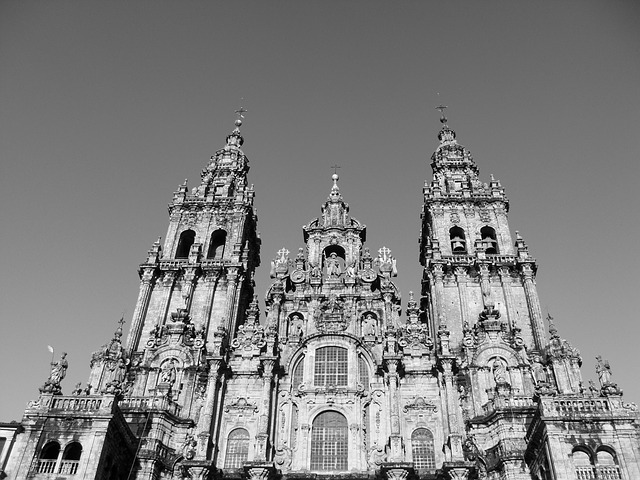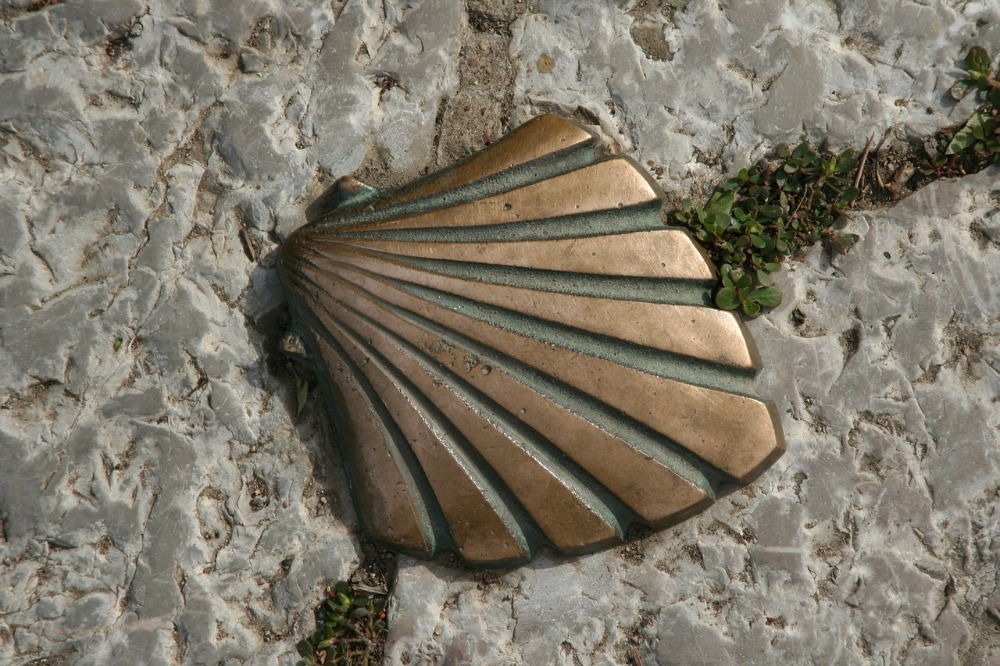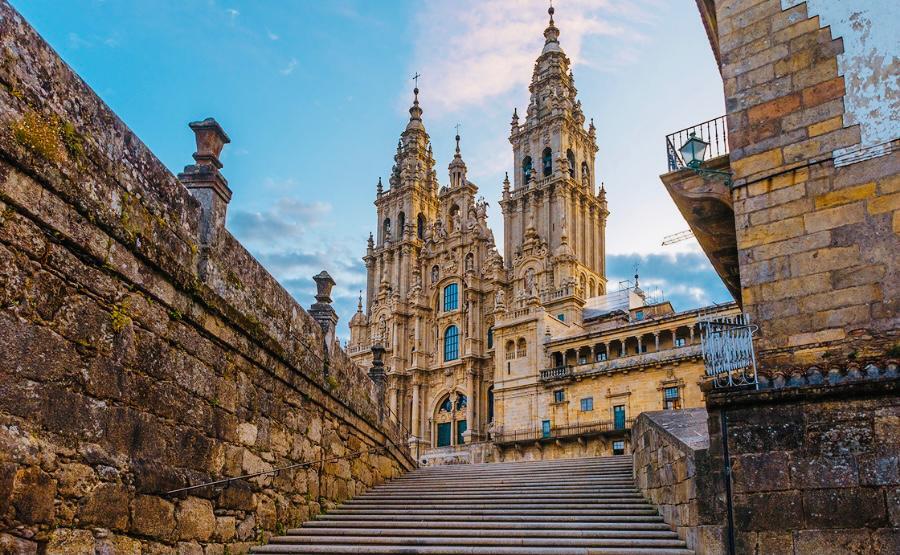
The St. James the Apostle is the eldest son of Zebedee and Mary Salome. Brother of John, the Evangelist. They lived in the city of Bethsaida, by the Sea of Galilee, where they had a small fishing business.
The name Santiago comes from the words Sant Iacob, from the Hebrew Jacob. During battles the Spaniards used to shout out Saint Jacob, help us and by saying it fast and repetitively it sounded like Santiago.
After witnessing the miraculous catch of fish, hearing Jesus say to them, "From now on you will be fishers of men," James left his nets, his father and his fishing company and set out to follow Jesus Christ.
James the Greater was one of the twelve disciples. Together with Peter and John, they accompanied Jesus in very important moments of his life. Such as the Transfiguration of the Lord, which we remember in the fourth of the Luminous MysteriesThe miraculous catch of fish and Jesus' prayer in the Garden of Gethsemane, among others.
The Acts of the Apostles relate that James was the first apostle martyred, beheaded by order of Herod Agrippa around the year 43 in Jerusalem.

Santiago came to Spain to proclaim the Gospel. The Cathedral of Santiago de Compostela is its main sanctuary, where the relics of the apostle are kept. Thousands of people make pilgrimages there every year, eager to walk the Camino de Compostela. Santiago apostle is represented dressed as a pilgrim or as a soldier mounted on a white horse in fighting attitude.
In 1982, when St. John Paul II visited this Spanish Cathedral, he called on Europe to revive "those authentic values" proclaimed by St. James.
The apostle St. James is also known for having paved the way for the Virgin Mary to be recognized as the "Pillar" of the Church.
Pope Francis, in February 2014, reflecting on armed conflicts, noted that James gives us simple advice: "Draw near to God and He will draw near to you."
Although since the ninth century the kings of the reconquest recognized St. James the Apostle as their patron saint, it was not until the seventeenth century when the patronage of Spain was granted to the saint.
Pope Urban VIII, in 1630 declared, under the reign of Philip IV, that St. James the Apostle was officially recognized as the sole patron saint of Spain (which since 1627 he shared with St. Teresa of Jesus).
This decision was made in conjunction with the recognition by the Church that his remains were buried in Compostela and also establishing that the feast of St. James the Apostle would be celebrated every July 25.
Since 1646, by Philip IV, the Vow of St. James was institutionalized, which consisted of an offering by the kings, princes and the archbishop of Compostela to the Virgin of Santiago de Compostela. Santiago Cathedral every July 25th. This offering still takes place today, albeit in a symbolic way, at one of the parts of the Mass of the celebration on the Apostle's Day.

"The Camino de Santiago awakens one of the deepest desires of man's heart, the yearning to purify oneself, to improve; in short, the desire for God." St. Josemaria Escriva Image by Almudena Cuesta
It is the 25th of July when the festivity of the apostle Santiago and the day of Galicia is celebrated. This is a Christian celebration that takes place in many Spanish towns and places around the world.
However, since the end of the Dictatorship in Spain, the Apostle's Day is not a holiday throughout the country, but only in the autonomous communities that so decide each year when setting their holiday calendar, with the exception of Galicia, which celebrates its big day, so it is a holiday every year.
On this day we celebrate the death of the saint, his death by martyrdom, an end that together with his character as a disciple very close to Jesus Christ gives him his name of apostle and saint. There are data and references that point to the year 44 as the date of the martyrdom of Santiago, although the choice of July 25 does not seem to be based on any historical data.
In any case, the celebration of St. James' Day is a very ancient celebration, a feast established in Rome around the tenth or eleventh century when we have news of its celebration in the Roman basilica of St. Peter.
In addition, on the day of St. James plenary indulgences can be obtained, that is, the possibility of obtaining forgiveness of sins for the pilgrims or faithful. In order to gain the Jubilee, and obtain the plenary indulgence, three conditions must be fulfilled:
Today, in the XXI century, the feast of St. James Day is celebrated more than ever in Galicia in the city of Santiago de Compostela. It represents the religious and forgiveness aspects that unite and congregate pilgrims from all corners of the world in the different areas of the city.
During the 25th, the celebration of La Holy Mass solemn ceremony in the cathedral, in which the king or a delegate of the Royal Household makes the traditional offering to the apostle Santiago.
Within the current celebration are the magnificent fireworks that take place in the Plaza del Obradoiro during the night of the 24th, which in recent years has been accompanied by projections and audiovisual shows on the facades of the cathedral and other historic buildings in the square.
"...from James we can learn many things: the readiness to welcome the Lord's call even when he asks us to leave the boat of our human securities, the enthusiasm in following him along the paths he points out to us beyond our illusory presumption, the readiness to bear witness to him with courage, if necessary even to the supreme sacrifice of life. (...) Following Jesus like James, we know, even in the midst of difficulties, that we are on the right path."
Benedict XVI, General Audience June 2006
The apostle Santiago is one of the most important saints of Christianity. After the discovery of his tomb around the year 813, where his remains rest, many Christians from the north of the country began to pilgrimage to what is now Santiago de Compostela to show his devotion.
This custom became a tradition, expanding the phenomenon of the Camino de Santiago throughout Europe, so that the city became one of the most important centers of pilgrimage in Christianity, along with Rome and Jerusalem.
In addition, pilgrims to Compostela could obtain general forgiveness for all their sins, a forgiveness that could be extended to the whole year when the feast fell on a Sunday, that is, when it was a Compostelan Holy Year.

Almighty and merciful God,
that you chose twelve apostles to evangelize the whole world.
Among them, three were favored in a special way by Your Son Jesus Christ,
who deigned to include the Apostle Santiago in this select number.
Through her intercession may we be worthy to obtain the glory of Heaven,
where You live and reign forever and ever. Amen.
This saint is closely related to Zaragoza since it is known that Santiago Apostle "arrived with his new disciples through Galicia and Castile, to Aragon, where the city of Zaragoza is located, on the banks of the Ebro.
On the night of January 2, 40, Santiago was with his disciples by the Ebro River when "he heard the voices of angels singing Ave Maria, Gratia Plena and saw the Virgin Mother of Christ appearing, standing on a marble pillar".
The Blessed Virgin, who was still living in mortal flesh, asked the Apostle that a church be built for her there, with the altar around the pillar where she was standing, and promised that "this place will remain until the end of time so that the virtue of God may work portents and wonders through my intercession with those who in their needs implore my patronage".
The Virgin disappeared and the jade pillar remained there. The apostle Santiago and the eight witnesses of the prodigy immediately began to build a church on that site. The Basilica of the Virgin of Pilar in Zaragoza.
In honor of the apostle, one of the towers of the Pilar, the high gate of the Plaza, bears the name of Santiago. In addition, Zaragoza is also one of the stops on the Camino de Santiago and has a church named after the apostle: the Church of Santiago el Mayor, where Holy Mass is celebrated on St. James' Day.
Bibliography: